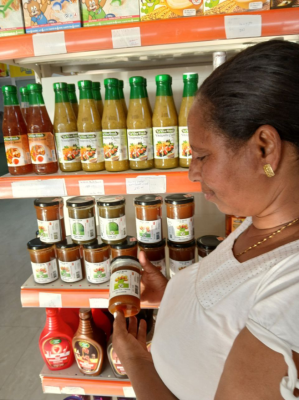The Path to Free Enterprise
 Tsega’s entrepreneurship began modestly, with a local juice cafe run for over a decade. She noticed that Beles, the local name for prickly pear, was underutilized despite growing abundantly in the highlands of northern Ethiopia. Rich in vitamin C, fiber, and antioxidants the fruit was only traditionally consumed fresh or made into jams and marmalades.
Tsega’s entrepreneurship began modestly, with a local juice cafe run for over a decade. She noticed that Beles, the local name for prickly pear, was underutilized despite growing abundantly in the highlands of northern Ethiopia. Rich in vitamin C, fiber, and antioxidants the fruit was only traditionally consumed fresh or made into jams and marmalades.
Spotting this gap, Tsega innovated: “There is ample Beles supply, but it was never value-added,” she says. Thus, the patented “Tsega Beles” juice was born. Her product quickly expanded from local sales to Addis Ababa. Encouraged by positive feedback, she even sent 4,000 bottles to Italy, showing the product’s export potential. To secure a steady supply of packaging, she took a bold step: buying a stake in the establishment of a local glass bottle factory, ensuring future access to packaging for her growing business.
The Sudden Halt: Conflict and Collapse
Just as Tsega’s business was poised for international growth, back-to-back crises brought everything to a grinding halt. First came the COVID-19 pandemic, disrupting supply chains and markets. Not long after, conflict broke out in northern Ethiopia, hitting Mekelle’s region hard. The damage went beyond business interruption: it was a full-scale collapse of the supply chain.
“Everything was either destroyed or looted: the credit I had received, the factory, and our production space,” Tsega says. Her dream of becoming a major Beles juice supplier was put on indefinite hold. Like many others in the region, Tsega was left in despair, her years of hard work reduced to near rubble.
A Lifeline for Post-Conflict Recovery
 In the aftermath of the conflict, Tsega found a critical lifeline through a post-conflict recovery program initiated by CIPE. The program was designed to support Micro, Small, and Medium Enterprises (MSMEs) in affected areas, helping them regain their footing and strengthen their capacity.
In the aftermath of the conflict, Tsega found a critical lifeline through a post-conflict recovery program initiated by CIPE. The program was designed to support Micro, Small, and Medium Enterprises (MSMEs) in affected areas, helping them regain their footing and strengthen their capacity.
CIPE’s implemented this initiative in collaboration with the Alliance for Civil Society Organizations in Tigray (ACSOT) and the Tigray Women Entrepreneurs Association (TWEA). It aimed to foster growth by strengthening businesses. CIPE’s support focused on three key components: Direct support through the Women Business Resource Centers (WBRCs); training, Business Development Services , and Mentorship; and Networking and Learning Platforms.
Tsega became part of the WBRC in Mekelle, a hub that offers MSMEs a space for training, networking, and peer support.
“The training helped me recover emotionally from the trauma of what I had gone through,” she says. “Meeting with other women, sharing experiences – it reminded me I wasn’t alone.”
Relaunching with Stronger Skills
The sessions were practical, providing vital skills development. “Before, we ran our business traditionally,” Tsega explains. “Now I understand how to prepare a balance sheet, develop a business plan, and manage operations more professionally,” thereby strengthening business integrity.
She emphasizes that finance is not the only thing an entrepreneur needs— it’s also about mindset and economic resilience. The program also improved her communication skills and provided digital literacy training, opening doors for new market opportunities.
A Stronger Vision for the Future
Despite ongoing challenges like accessing packaging materials, Tsega is far from discouraged. Thanks to the CIPE training, she has a clearer vision and a stronger strategy.
“It gave me a better perspective on how to handle losses and plan for recovery. It’s not just about what we lost, it’s about where we go from here,” she says.
She is already putting effort into exporting her product to the Dubai market. Tsega believes that Beles juice can be more than just a product: it can be a symbol of recovery and strength in the region.
The post-conflict recovery program was implemented by CIPE and supported by GIZ’s PSD-E project — funded by the German Government, the European Union, and the Minister for Trade and Development Cooperation of the Netherlands.
Published Date: November 20, 2025
